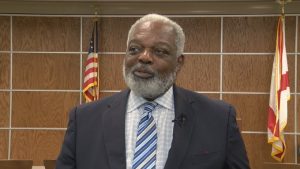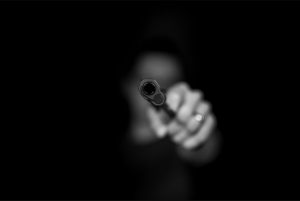A look at jurors in the manslaughter trial of former suburban Minneapolis police officer Kim Potter, who is charged in the April shooting death of 20-year-old Black motorist Daunte Wright. Potter says she meant to use her Taser and drew her gun by mistake.
Also read: Key moments in the police shooting of Daunte Wright
The jurors are anonymous by order of the court. The 12 who remained after two alternates were dismissed after closing arguments Monday include nine who identify as white, two who are Asian and one who is Black. The panel is evenly divided on gender.
JUROR NO. 2
A white man in his 50s who works as a medical editor.
He said he has a “very unfavorable” view of the pro-police “blue lives matter” slogan, saying he believes it’s more of a counter against the Black Lives Matter movement rather than real support for police. But he also said he opposes cutting funding for police.
Also read: ‘I’m sorry it happened’: Ex-cop Kim Potter on Daunte Wright death
“I absolutely believe there’s a need for change,” he said. “But I think defund the police sends a message, a negative message.”
JUROR NO. 6
A white woman in her 60s. She’s a retired special education teacher who also taught English to immigrants and loves true crime shows.
She said she doesn’t understand how something like Wright’s death could happen, but also said: “I really feel for any law enforcement because things can happen just so, so quickly.”
JUROR NO. 7
A white man in his 20 who works as an operations manager at a large retailer. He is also a bassist in an alternative rock band.
He wrote on a jury questionnaire that he is slightly distrustful of police. He said he believes they have a hard job, but also should be held to the highest level of scrutiny.
JUROR NO. 11
An Asian woman in her 40s who described herself as a “rule follower.” She said police officers should be respected, and on a questionnaire she somewhat agreed that police officers should not be second-guessed.
Also read: Trump sues NY attorney general seeking to end civil probe
“I think sometimes you just react, and sometimes it might be a wrong reaction, but, you know, mistakes happen,” she said.
JUROR NO. 17
A white woman in her 20s who recently graduated and is working full-time.
She said policing protests in the Minneapolis area have had a negative impact on the community because of property damage.
She said she somewhat disagreed with defunding the police: “You’re always going to need police officers.”
JUROR NO. 19
A Black woman in her 30s, a teacher and mother of two who said she carries a stun gun in her purse. She’s also is a gun owner with a permit to carry.
“I remember panic in the video,” she said.
She had a somewhat negative impression of both Wright and Potter, saying of Potter: “Having this much experience, you know, in that moment, where did your lapse in judgment come from?”
She strongly disagreed that police officers should not be second-guessed for their decisions.
“This is a servitude job, and when you get into this position, you need to understand that it’s a tough job and so you have to maintain that level of professionalism when you get into that position.”
JUROR NO. 21
A white man in his 40s. He said on his questionnaire that he had “somewhat negative” impressions of both Potter and Wright.
“I don’t condone fleeing from a police officer,” he said of Wright. Of Potter, he said, “When training fellow officers, your actions should be more thought out.”
Also read: Over 40 people aboard Royal Caribbean ship test COVID positive
He said demonstrations about policing have had both positive and negative effects — positive because they started eye-opening conversations but negative because of the looting.
JUROR NO. 22
A white man in his 60s who is a registered nurse, studying to become a nurse practitioner.
He said he strongly agrees that police make him feel safe and somewhat agrees that their actions shouldn’t be second-guessed.
“You know, they’ve got a difficult job. And maybe it’s just me but I, I don’t know that I necessarily raise them up to a higher standard, but I certainly expect them to be law abiding.”
He said he believed Potter when she said she didn’t mean to shoot Wright.
JUROR NO. 26
An Asian woman in her 20s who was reluctant to be on the panel, saying she has a lot of friends and family who “are very opinionated in the matter.”
She said her workplace was damaged in a demonstration over policing, and that it made her “angry and upset” because she thought those who did the damage were just taking advantage of the protests.
JUROR NO. 40
A white man in his 40s who said he once wanted to become a police officer but changed his mind because he was “afraid that I would end up having to use my gun.” He has worked in IT security for the last 20 years.
He had a somewhat negative impression of both Potter and Wright, saying Potter should have had enough “muscle memory” to know which side of her body her Taser was on.
He strongly agreed that police in his community make him feel safe. But he said he strongly disagrees that police should not be second-guessed for their decisions.
JUROR NO. 48
A white woman in her 40s and a mother of two who used to work as an IT project manager. She has also worked as an elections judge.
She said Wright should not have died for something like expired tags — a reason given by officers for pulling him over.
JUROR NO. 55
A white man in his 50s, a Navy veteran and former Boy Scout leader who said he competes in medieval steel combat in his spare time. He works as a field systems engineer for a cybersecurity company.
He said he saw a video clip of the shooting and thought the situation was stressful because it looked like a lot of things were happening at once.
He said he has a somewhat unfavorable impression of blue lives matter, saying “You can choose your vocation, but you can’t chose your skin color.”
He said protests in the Minneapolis area over the last two years have been positive overall because regularly examining what leaders and law enforcers are doing is good for society.






